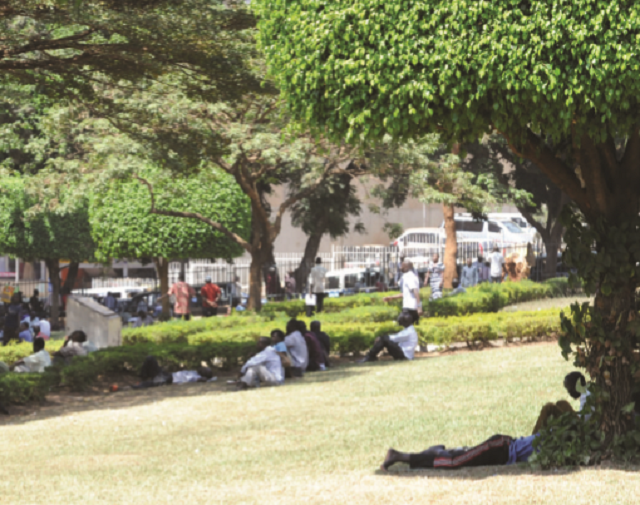
Researchers recommend fighting Non-communicable Diseases with jogging, playing, relaxing in public parks
Researchers who recently published a study on public parks in Kampala now want the city authorities to remove encroachers and create new spaces for residents to use for exercise, recreation, and relaxation.
David Ouma Balikowa, who was the lead researcher for a study entitled “Availability and Quality of Parks in Kampala”, says people who have encroached on public spaces should be compensated and the spaces made available again for public use.
“Just as Ugandans crave wider roads, the same should apply to these public spaces,” he told The Independent in an interview recently, “If you can find money to compensate people to build wider roads, you cannot tell me you can’t find money to compensate owners of idle land in the city to create public green spaces.”
Balikowa says without green spaces, millions of lives of Kampala residents could be left at the risk of developing sedentary lifestyle diseases as they will not have spaces to walk, relax, and play.
The study was published last November by the Non-Communicable Diseases Information and Control Centre (NICC), with support from the Canadian non-profit, Health Bridge, which promotes awareness of Non-communicable Diseases (NCDs), ailments which have been described as a “time bomb” for Uganda. They include asthma, diabetes, cancer, kidney disease, cardio vascular diseases, mental illnesses, and high blood pressure or hypertension.
“We realised, especially in urban places, that before you tell people to engage in exercise, the infrastructure and supportive environment must be there,” Balikowa said, “That is why we had to find out the available public spaces where one can go and engage in these kinds of physical or recreational activities.”
Balikowa says rapid population growth coupled with unplanned property development has left Kampala with few parks for the fast-growing population and recommends that KCCA develops a Parks Master Plan to outline the city’s vision for parks and open spaces and maintain existing ones by improving bordering streets, putting in safe footpaths, street crossing aids, and speed limits. He says KCCA could also purchase land, adopt informal open spaces, and sign agreements with landowners and residents to develop green spaces, especially in areas where low income residents live.
Balikowa’s views are backed by other experts on urban planning, human health, and psychology.
Amanda Ngabirano, a lecturer of Urban and Regional Planning in the Department of Architecture and Physical Planning at Makerere University told The Independent that although public parks “contribute to social cohesion,” authorities in Uganda wrongly look at them as an unaffordable luxury.
Meanwhile, Dr. Paul Nyende, a senior lecturer of psychology at Makerere University says any well-planned city must have places where people go to relax given that many cities do not have enough space in homes for relaxation or exercise. He said regular physical activity improves overall wellbeing, reduces the risk of some NCDs, and generally improves mood.
“This is why in large cities like New York you have Manhattan Island with a lake and a large green space (Central Park).
“One wonders why such prime land worth billions of dollars would be left to trees and a little lake. But such places have an intrinsic value for the city inhabitants,” Nyende said.
Despite these expert views, Kampala Capital City Authority (KCCA) officials say they are unlikely to do much more than they have already done to ensure city residents have access to more public parks.
Peter Kauju, the Spokesperson for KCCA told The Independent that creating more public parks would involve breaking down buildings.
Kauju said, however, over the last four years KCCA had taken steps to preserve available open public spaces. These include reclaiming and restoring parks like the Wandegeya Children’s Park which army veterans had encroached on, the Sheraton Gardens, Constitution Square, Centenary Park, Nakawa Park, and Kamwokya Children’s Park.
Kauju said KCCA has also written to the heads of the 79 schools under its jurisdiction, those whose land is owned by religious bodies, and the Uganda Land Commission to secure the land titles so they may not cross into private hands.
But Ngabirano insists parks can be reclaimed not only in Kampala but all over Uganda’s fast growing towns if the leaders are sensitized and there is the will. She says public spaces must be managed by public bodies because private developers will always charge users and potentially exclude a certain class of people.
Residents want relaxation
Balikowa’s study reported similar views. It noted that many city residents, in interviews, had said they want public parks for relaxing and to visit with friends, and generally avoided places where they are made to pay. As a result of this, Balikowa and his team recommended that KCCA improves on the sitting areas in existing public parks.
In separate interviews, The Independent found almost similar sentiments.
 The Independent Uganda: You get the Truth we Pay the Price
The Independent Uganda: You get the Truth we Pay the Price



